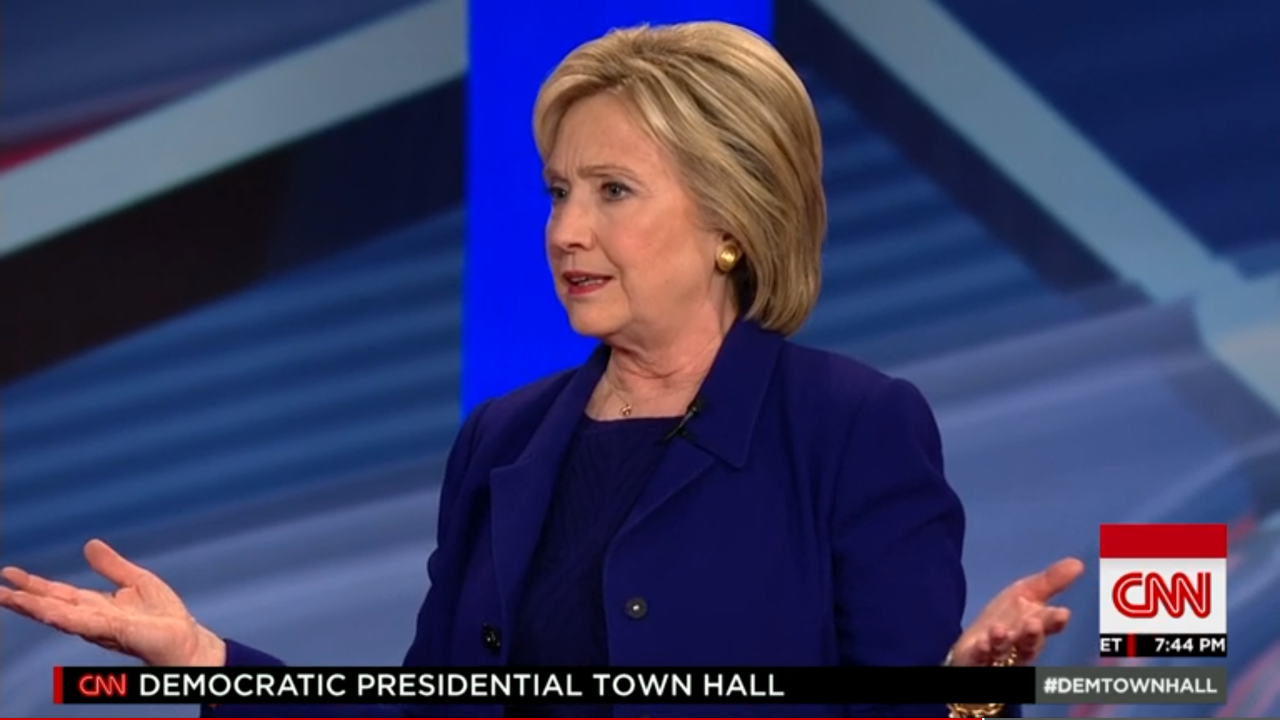
Hillary Clinton at a Democratic town hall debate, hosted by CNN in New Hampshire, February 3, 2016.
At last night’s Democratic town hall, Hillary Clinton challenged critics who describe her as too close to monied interests to name a time when that cozy relationship influenced her policy decisions.
Moderator Anderson Cooper of CNN had asked if Hillary Clinton made a mistake when she delivered three speeches to Goldman Sachs, receiving $675,000 in payments. “That’s what they offered,” she said with a shrug, continuing: “Anybody who knows me, who thinks that they can influence me, name anything that they’ve influenced me on. Just name one thing. I’m out here every day saying ‘I’m going to shut them down, I’m going after them, I’m going to jail them if they should be jailed, I’m going to break them up.'”
But a tweet from investigative journalist David Sirota reminded us that, in a 2004 interview with Bill Moyers, Elizabeth Warren pointed to a time when donors’ interests may have changed Hillary Clinton’s position.
Clinton challenged anyone to name a time when money influenced her.
Sen. Warren answered that challenge in 2004: https://t.co/eGyhAxBzDP
— David Sirota (@davidsirota) February 4, 2016
Warren — at the time a Harvard law professor — recounted how, in the 1990s, she wrote an editorial opposing a proposed piece of legislation tightening bankruptcy laws. Warren explained that it would disproportionately hurt single mothers. Hillary Clinton, at the time the first lady, read the editorial, and asked for a meeting with Warren. The meeting went well; Warren said she “never had a smarter student.” Afterward, Clinton returned to Washington and, according to her biography, persuaded Bill Clinton to veto the legislation.
But when Hillary Clinton was elected to the Senate and another version of the same bill came to the floor, she did an about face:
ELIZABETH WARREN: She voted in favor of it.
BILL MOYERS: Why?
ELIZABETH WARREN: As Senator Clinton, the pressures are very different. It’s a well-financed industry. You know a lot of people don’t realize that the industry that gave the most money to Washington over the past few years was not the oil industry, was not pharmaceuticals. It was consumer credit products. Those are the people. The credit card companies have been giving money, and they have influence.
BILL MOYERS: And Mrs. Clinton was one of them as senator.
ELIZABETH WARREN: She has taken money from the groups, and more to the point, she worries about them as a constituency.
BILL MOYERS: But what does this mean though to these people, these millions of people out there whom the politicians cavort in front of as favoring the middle class, and then are beholden to the powerful interests that undermine the middle class? What does this say about politics today?
ELIZABETH WARREN: You know this is the scary part about democracy today. It’s… We’re talking again about the impact of money. The credit industry on this bankruptcy bill has spent tens of millions of dollars lobbying, and as their profits grow, they just throw more into lobbying for how they can get laws that will make it easier and easier and easier to drain money out of the pockets of middle class families.
[2/7/2016 Update: Hillary Clinton responded to Senator Warren’s story this morning on ABC’s This Week with George Stephanopoulos. Clinton said that she voted for the 2001 bankruptcy legislation because she was able to get an amendment into the bill that protected the child support or alimony payments for single mothers. As part of that deal, she says, she had to vote for the bill. You can read Clinton’s entire response at ABC News and watch the video clip at Mediate.]
While quid pro quo exchanges of donations for votes can be hard to prove, Warren’s story demonstrates how our campaign finance system keeps the interests of wealthy donors at the forefront of elected official’s minds when they make decisions. Here’s the clip from Bill’s conversation with Warren:
The 2001 bill that Warren talks about didn’t pass. In an article about the vote published during Clinton’s first campaign for president, a spokesman for the Clinton campaign told The New York Times’ Katherine Q. Seelye that Senator Clinton “helped forge a compromise … intended to ensure that custodial parents got child custody payments.” When the bill came up again in 2005 without that provision, Clinton opposed it, the spokesperson said. (Clinton was not present to vote on the 2005 bill because her husband was in the hospital.)
It’s worth noting that the cost of elections has increased exponentially since Bill and Warren spoke in 2004. Candidates in the presidential election that year raised $880.5 million. Candidates in the 2016 election cycle had raised that much by New Year’s Eve 2015, with more than ten months still to go until the election. And that figure doesn’t include the dark money groups that don’t disclose donors to the FEC, and which weren’t a feature of pre-Citizens United elections — as in 2004. Some predict this year’s presidential election spending will top out around $5 billion. And a good portion of the millions raised so far went from Wall Street to Clinton, report The Washington Post’s Matea Gold, Tom Hamburger and Anu Narayanswamy:
Through the end of December, donors at hedge funds, banks, insurance companies and other financial-services firms had given at least $21.4 million to support Clinton’s 2016 presidential run — more than one of every 10 dollars of the $157.8 million contributed to back her bid, according to an analysis of Federal Election Commission filings by The Washington Post…
In all, donors from Wall Street and other financial-services firms have given $44.1 million to support Hillary Clinton’s campaigns and allied super PACs, compared with $39.7 million in backing that former president Bill Clinton received from the industry, according to campaign-finance records dating back to 1974 that have been compiled by The Post.
Meanwhile, in an interview with David Sirota, Elizabeth Warren, now the progressive senior US senator from Massachusetts, scoffed at comments made yesterday by Goldman Sachs head Lloyd Blankfein, who alleged that Clinton rival Bernie Sanders’ campaign might be leading America toward a “dangerous moment.” (Sanders has bluntly discouraged Wall Street from backing him.)
“When Blankfein says that criticizing those who break the rules is dangerous to the economy, then he’s just repeating another variation of ‘too big to fail,’ ‘too big to jail,’ ‘too big even to prosecute,'” Warren told Sirota.
“That tells you here we are, seven years after the crisis and these guys still don’t get it. Seven years. That crisis cost an estimated $14 trillion, it cost jobs, it cost homes, it cost retirement funds. And Lloyd Blankfein stands up and says ‘Don’t even criticize me, I ran a company that was right at the heart of some of the biggest financial frauds in history and made money off it, but don’t you dare criticize me.’ That’s his position? That’s why we need voters to get really engaged.”
Note: This post was updated on Friday afternoon, Feb. 5, 2016, to include a quote from a 2007 article about the bankruptcy bill in The New York Times, and on Sunday, Feb. 7, 2015, [see brackets] to include Secretary Clinton’s response to Elizabeth Warren’s story and links to the video of her remarks.




